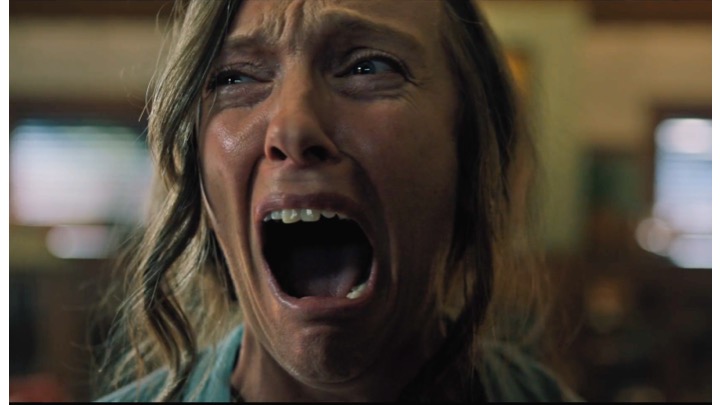“Hereditary” – Look up the word “hereditary”, and some of the listed synonyms are: inherited, genetic and family.
Obviously, children inherit their parents’ genetic makeup, and this carries a scientific connotation, because at its core, this transfer is purely and factually clinical.
Family, on the other hand, implies a loving home, one full of life lessons, support, concern, and care. The words inherited and genetic always occur with 100 percent certainty. Meanwhile, a family that lives in a loving household is less than certain. Love is always the hope, but sometimes (or many times), it doesn’t pan out that way. On the surface, the Grahams do have a loving home, but it vulnerably sits at extreme risk.
Ellen’s health is no longer at risk, because writer/director Ari Aster’s film begins with this grandmother’s obituary and funeral service, as her daughter Annie (Toni Collette) delivers a eulogy with every seat occupied and every person paying their respects. Quickly, we discover that Ellen and Annie have been estranged for long stretches, but they recently reconnected. To Annie, a cloud of mystery always seems to follow her mother, and ultimately, she never really understood her.
It feels difficult to know the direction of Aster’s film, but at some point (which will not be identified in this review) during the 127-runtime, it serves up a massive blow. After you pick yourself off the floor from this said event, the remainder of the film forces the audience to cope with the emotional toil and a deeply unsettling narrative, and again, it masks its ultimate direction.
This family is in trouble. Massive trouble. Although Annie, her husband Steve (Gabriel Byrne), their 16 or 17-year-old son Peter (Alex Wolff), and 13-year-old daughter Charlie (Milly Shapiro) do love one another, life’s ever-present – but hardly ever witnessed – wrecking ball pulverizes their family’s foundation and left it with no foreseeable resurrection.
While the Grahams deeply suffer and are left in a vulnerable and immeasurable state, this is when outside evil can seep into their pores and begin to alter DNA. Genetically.
In his feature film debut, Aster does not manipulate the audience with jump scares or sudden bursts overwhelming noise that horror films have employed thousands and thousands of times over the years. Sure, such moments – in other horror movies – are effective in the short-term (five seconds at a time), but Aster takes a much different approach and builds a brooding, unsettling universe in the Salt Lake City suburbs. This universe chiefly exists within the Graham house, full of wood flooring, wood railings, wood ceiling supports, lonely hallways, and dimly-lit rooms.
The atmosphere feels reminiscent of “The Conjuring” (2013) meets “It Comes at Night” (2017) with long slow walks and turns through the huge home, and Aster plays with framing. He deliberately leaves empty space in several shots that could or could not be filled with something sinister. Sometimes, he fills these spaces and other times, he doesn’t.
The end result? Not one moment in this house feels comfortable.
The Grahams don’t exactly exude comfort either, because they hardly ever talk to one another in meaningful, therapeutic ways. When they need to clarify their feelings, or quite frankly, tell the truth, they cloak themselves in silence or offer surface-level retorts to simply get through the next few minutes. With each family member marching in emotional isolation, they become more susceptible to a supernatural darkness.
Rather than clearly identifying the film’s main antagonist and his or her associated motivations, it is best to just witness this horror film yourself and watch the twisted narrative unfold. Like the title of the film suggests, family and its markings reside at the center of the story, and the picture dives into bizarre territory, led by two heroic performances by Collette and Wolff. Shapiro’s Charlie plays a titanic portion of the Graham family’s struggles, and her unique physical look – which stands in stark contrast with Annie, Steve and Peter – will initially leave an audience puzzled. Aster, however, gives a proper explanation later in the film through one specific, unsuspecting line of on-screen conversation. This is not uncommon, because Aster answers big questions along the way through seemingly unassuming dialogue, but each reveal slowly paints a complete picture.
It will take about 2 hour and 7 minutes to capture a full understanding, but this film’s impact will linger like a dark, hovering fog that you’ll wish to wipe away from your mind during some future moment of work, play or rest. Such hopes are fleeting, however, because “Hereditary” – the most disturbing horror film of the year, so far – will leave a permanent mark. That makes perfect sense, because “inherited” and “genetic” are delivered in real-life with 100 percent certainty.
⭐⭐⭐ 1/2 out of ⭐⭐⭐⭐
Image and Trailer credits: A24




